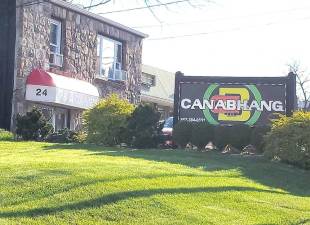West Milford determines the future of cannabis in town
WEST MILFORD. An ordinance covering everything from air filtration to signage details may be up for a vote on July 13.

An ordinance to create a “Route 23 Cannabis Establishment Overlay Zone” will be considered for adoption by the Township of West Milford Council at its July 13 meeting in the municipal building meeting room. During a June 14 council workshop discussion, Councilman Michael Chazukow said he is not happy about adopting this ordinance that strictly affects cannabis businesses while those with liquor licenses do not have the same restrictions. He does not support passage of the proposed ordinance. There will be a public hearing at the meeting prior to the council vote.
In other action related to controlling cannabis businesses, the council at their latest meeting responded to public requests by updating an ordinance passed earlier defining what constitutes a “park.” Patricia Wenzel, of Bearfort Road, a staunch objector to action taken by the council last month, thanked the council for listening to the public concerns and making the requested changes by approving Ordinance 2022-023 at the latest council meeting. Both the newly proposed ordinance and the updated document amend “Chapter 500 Zoning” of the Revised General Ordinances of the township.
Wenzel had asked that there be an acre of land as a buffer between businesses and where children would be gathering. She also requested that when defining “parks” that the council consider all types of parks. Councilwoman Ada Erik had indicated she had some issues with the one-acre size, 200 feet by 200 feet, because a lot of parks are smaller. She also questioned “being government owned,” since private lake communities have park facilities for children in their communities.
Chazukow believes that retail growing and manufacturing of cannabis with no consumption taking place, does not expose children to any risk. He said children would be seeing storefronts just like they do with businesses where alcohol is sold. He said he does understand the prohibition at parks where there could be conflicts with rules or liability issues that vary if the park is state or federally owned. Chazukow noted that defining “park” actually makes a park more restrictive.
Councilman Marsden wanted “something on the books” with other changes later if the council found that feasible. There could be proposals for future updates if the council sees need for them.
The council decided to update the park definition ordinance to minimize confusion and better define parks, park areas or municipal grounds as park areas. Ordinance 2022-023 now defines a park area as land larger than one acre used for active recreation and owned and managed by a government entity and has improvements such as athletic fields, playground equipment and/or pavilions. The ordinance was adopted on May 18.
Ordinance 2022-30 establishing a cannabis overlay zone that is coming up for a public hearing and council vote next month says that cannabis cultivators, manufacturers, wholesalers, distributors, retailers, and delivery services shall be a permitted use on all properties within the Cannabis Establishment Overlay Zone, subject to criteria. Any cannabis facility must have direct access from Route 23/Paterson Hamburg Turnpike. The minimum lot area shall be two acres in residential zones, otherwise the underlying zone’s minimum lot size shall apply.
The minimum front yard setback shall be 50 feet or the minimum zone standard, whichever is greater. Screening must be implemented if any cannabis facility is within 50 feet, measured from building-to-building, of a residential use. All facilities shall be enclosed in heated/air-conditioned buildings, not in greenhouses, hoop houses or outdoors. The facility shall provide an air treatment system with sufficient odor absorbing ventilation and exhaust systems such that any odor generated inside the facility is not detectable by a person of reasonable sensitivity at the property line of the subject property. Odor from the facility shall be monitored on an annual basis at the discretion of the township by a licensed qualified contractor chosen by the township.
Signs shall be limited to the address, name of the company and emergency contact information located on one ground-mounted sign that is not to exceed 24 square feet. The facility must have a valid license to operate from the State of New Jersey. Any cannabis facility is subject to compliance with all state laws, regulations and guidelines with respect to cannabis licenses issued by the state.
